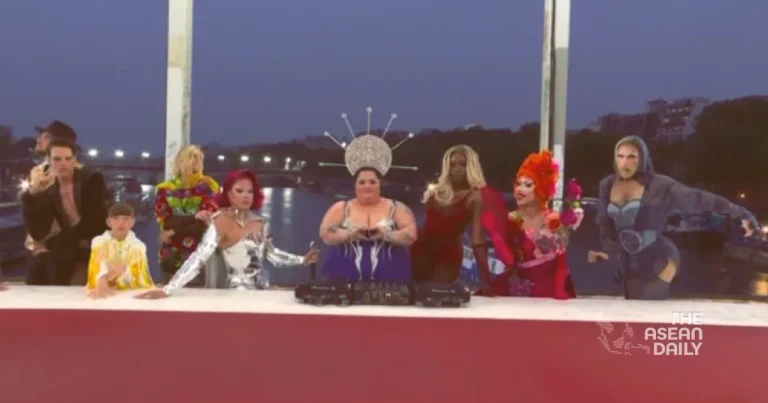29-7-2024 (PARIS) The organisers of the Paris 2024 Olympic Games have issued an apology following a contentious segment in the opening ceremony that drew ire from Christian groups worldwide. The tableau, which bore a striking resemblance to Leonardo da Vinci’s iconic “The Last Supper” painting, sparked heated debate and accusations of religious insensitivity.
The controversial scene featured an eclectic ensemble including drag queens, a transgender model, and a nude performer portraying Dionysus, the Greek god of wine. This modern, avant-garde interpretation of the biblical scene quickly became a flashpoint for criticism, particularly from Catholic Church officials and conservative religious groups in the United States.
Anne Descamps, spokesperson for Paris 2024, addressed the controversy at a press conference on Sunday, 28th July. “Clearly, there was never an intention to show disrespect to any religious group,” Descamps stated. “The opening ceremony tried to celebrate community tolerance. We believe this ambition was achieved. If people have taken any offence, we are really sorry.”
The International Olympic Committee acknowledged the clarification provided by the Paris 2024 organisers but refrained from further comment.
Thomas Jolly, the artistic director responsible for the ceremony, defended the tableau, asserting that it was not inspired by “The Last Supper” but rather depicted a pagan feast associated with the gods of Olympus. “You will never find in my work a desire to denigrate anyone or anything,” Jolly told broadcaster BFMTV.
The incident has reignited discussions about France’s complex relationship with religion and secularism. While the country takes pride in its Catholic heritage, it also boasts a long-standing tradition of secularism and anti-clericalism. In France, blasphemy is not only legal but often considered a fundamental aspect of freedom of expression.
Hugo Bardin, whose drag queen persona Paloma participated in the tableau, expressed disappointment at the organisers’ apology. “An apology means recognising a mistake, recognising that you deliberately did something to harm, which was not the case,” Bardin stated. He suggested that the real issue for critics was not the recreation of the painting itself, but the fact that it was performed by queer individuals.
While supporters of the tableau praised its message of inclusivity and tolerance, religious leaders voiced their disapproval. The Catholic Church in France deplored the ceremony for including “scenes of derision and mockery of Christianity.” Archbishop Charles Scicluna, a high-ranking Vatican official, went so far as to contact the French ambassador to Malta, describing the tableau as a “gratuitous insult” to Christians.
Some observers have framed the controversy as another example of contemporary culture wars, amplified by the constant news cycle and social media platforms.
Jolly reiterated on Saturday that religious subversion was never his intention. “We wanted to talk about diversity. Diversity means being together. We wanted to include everyone, as simple as that,” he explained to reporters.




